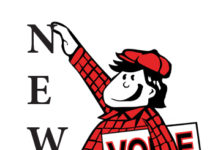 Marijuana backers, along with those opposed to allowing marijuana businesses in the City of Maple Valley made their way to the Wednesday, January 18, Planning Commission Meeting to testify at a Public Hearing regarding proposed amendments to the City’s zoning code regarding the sale of recreational marijuana within the city limits.
Marijuana backers, along with those opposed to allowing marijuana businesses in the City of Maple Valley made their way to the Wednesday, January 18, Planning Commission Meeting to testify at a Public Hearing regarding proposed amendments to the City’s zoning code regarding the sale of recreational marijuana within the city limits.
The issue of marijuana businesses being placed in Maple Valley began several years ago when a business attempted to open at Frontier Square on Kent Kangley. That business failed due to the inability to bring the building up to code. Then last year marijuana business owners saw an opportunity to place another marijuana business within the City when a preschool vacated a building.


During the two hours of testimonies, 49 speakers took 3 minutes each to present their cases. First up was Maple Valley Councilmember Megan Sheridan. After announcing that she was speaking for herself, she let everyone know that she had voted for the current marijuana store being placed in the City. She noted that while there were health concerns about marijuana, there were also other health concerns in the City such as fast foods, vape, cigarettes, and more. She also stated that she had talked with the police department and found that there was no uptick in crime or traffic related incidents since the retail shop opened.
Testimonies ranged from the fact that the State of Washington voters voted to legalize marijuana (i502) to marijuana still being illegal at the federal level. Supporters of the industry shared that it would be a tax benefit to cities allowing the business. There were those as well who pointed out that it was not government’s job to interfere with the free market. Some even commented that by having retail marijuana open for business, the black market would eventually go away.
On the other side of the debate, citizens pointed out statistics coming from Colorado where marijuana had also been legalized, and that there were increased healthcare costs, increased law enforcement incidents, and homeless counts on the rise. Another citizen presented information that out of all the millions of dollars that might potentially come in through marijuana business, for its part, Maple Valley might only see $48,000 per year after all the other revenues on the federal and state levels were taken out. This kickback might perhaps be quickly absorbed in the hiring of only one police officer.
Points were brought forward that it was nice to have a marijuana shop in town so that users did not have to go long distances to purchase their product. Countering comments from the other side pointed out that Maple Valley did not have all the business they shopped in either within city limits. There were many times they had to go out of town to shop those businesses.
Those involved in the Maple Valley marijuana business pointed out that there were many checks along the way before being able to buy any product from their business so that minors could not come in and purchase any product. However, counter points revealed that the product would still go into the homes where minors could still be impacted by the product. At one point, a couple of younger children came forward to testify, which was met with opposition. However, their testimonies were ultimately allowed by Chairman Robert Rohrbach.
Throughout the Public Hearing, a mixture of stories from how marijuana benefited the lives of those using the product to those who had begun their road to bigger drugs through alcohol and marijuana. It was also mentioned that marijuana affects users in different ways from those who used and no longer use to those needing it for “medical” reasons to those who went beyond into more dangerous drug use that caused end of life at an early age.
There were several citizens who testified that when they came to Maple Valley, one of the draws was that it was a family community. They called for letting voters decide the issue. One community member even suggested – why not make Maple Valley be a litmus test. Let the City be free of the marijuana businesses and see how it fairs against other cities around it that embrace marijuana.
Due to several more speakers wishing to have their testimonies heard, Chairman Rohrbach announced that the Public Hearing would be continued to Wednesday, February 1, beginning at 6:30 p.m. at the Tahoma School District Administration Board Room.








